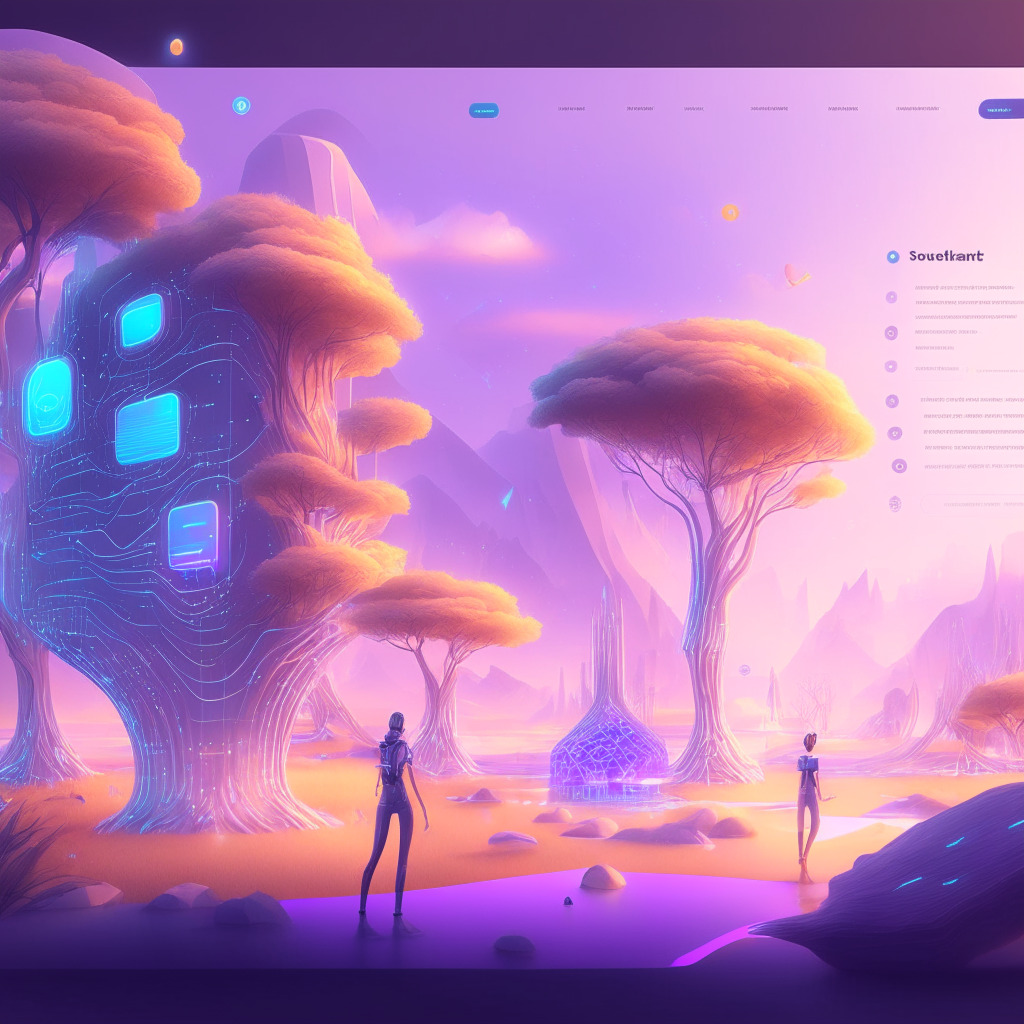Mirae Asset Securities collaborates with Polygon Labs to facilitate tokenization and Web3 integration with traditional finance. This alliance aims to create an infrastructure for issuing and transacting tokenized securities – translating tangible assets into blockchain-backed cryptographic tokens. The partnership anticipates reshaping capital markets by eliminating intermediaries, promising a more efficient, transparent, and inclusive global financial system.
Search Results for: Polygon Labs
Exploring Polygon Labs’ Bold Governance Overhaul: Embarking on a More Democratic Future?
Polygon Labs plans to restructure the governance of its upcoming Polygon 2.0 roadmap. The system will be based on three primary pillars: democratization, System Smart Contracts Governance, and Community Treasury. Each pillar allows for community involvement and transparency, aiming to create an ecosystem that is community-driven and encourages progress in the technological landscape.
Power Plays in Crypto: Polygon Labs Leadership Transition Amidst Blockchain Evolution
“Leadership transitions in digital currencies have ripple effects, potentially impacting the organization and the crypto space. Recently, Polygon Labs’ president, Ryan Wyatt, announced his departure, with Marc Boiron, the existing CLO, assuming the CEO role. These changes coincide with Polygon’s planned upgrades under ‘Polygon 2.0’, aimed at decentralizing governance.”
Blockchain Beats: The Future of Web3 Music with Warner Music and Polygon Labs
Warner Music Group and Polygon Labs have collaborated to launch a music accelerator program that fosters innovation in the intersection of music, technology, and Web3. The initiative supports decentralized music projects on the Polygon network, aiming to transform the distribution of music, stimulate artist-fan communities, and explore music-related merchandise opportunities.
The Evolutionary Leap: Polygon 2.0 and the Ripple Labs Expansion, Amidst Legalities and Ethical Quandaries in Crypto World
Polygon Labs announces its journey towards Polygon 2.0, aiming to boost the Ethereum blockspace and promise limitless scalability. While Ripple Labs extends its Liquidity Hub, offering improved customer experience, questions arise around potential legislative challenges. Developments in crypto legalities and ethical dilemmas in blockchain transactions continue to make the space more dynamic.
Crypto Code Ethics Dilemma: Matter Labs Vs Polygon Zero and Shrinking Canadian Ownership
“The CEO of Matter Labs, Alex Gluchowski, denies accusations from Polygon Zero of copying code without proper attribution, asserting that their systems, Plonky2 and Boojum, are implementations of RedShift, introduced by Matter Labs three years prior.”
Matter Labs vs Polygon: Open-Source Code Controversy Shakes Ethereum’s Layer 2 Community
Polygon has accused Matter Labs of using their open-source code without proper attribution in developing its zkSync rollup. This allegedly violates the open-source ethos, which forms a fundamental aspect of blockchain projects, thereby fostering discord in the ecosystem.
FastLane Labs’ MEV Solution on Polygon: Catalyst or Controversy?
Multicoin Capital leads a $2.3 million seed funding round for FastLane Labs, a maximal extractable value (MEV) protocol designed for the Polygon network. FastLane Labs offers an innovative auction system that rewards validators without spamming the blockchain, using off-chain and external auctions to minimize redundant transactions.
Navigating Change: The Dynamic Shifts in Polygon’s Leadership and Impact on Blockchain Future
“Polygon, a renowned Ethereum layer 2 scaling solution, is entering a new phase of development, marked by significant shifts in its leadership. Co-founder Jaynti Kanani steps back, while Marc Boiron becomes CEO, in sync with Polygon’s transition to Polygon 2.0, which bring substantial technological innovations in blockchain systems.”
Google Cloud Joins Polygon PoS Network: Boost to Cryptosphere or Threat to Decentralization?
Google’s entry into the Polygon PoS network could lift the blockchain’s credibility and promote mainstream adoption. But worries about centralization arise, potentially favoring powerful players over blockchain’s spirit of decentralization. With Google Cloud as a validator, maintaining a balance between corporate involvement and the founding principles of decentralization is essential.
Bull Meets Bear: Dissecting Polygon’s Resilience Above $0.50 Amid Bearish Sentiments
Despite market uncertainties, Polygon’s (MATIC) resilience above the $0.50 mark, robust upgrades, collaborations, and rewarding loyalty programs align with bullish sentiments, dwindling the likelihood of the token trading below $0.50. However, future market fluctuations remain unpredictable in the crypto rollercoaster.
Unveiling Polygon 2.0: Scaling Ethereum’s Future or Shaking Its Foundation?
Ethereum layer 2 developer, Polygon Labs, commences Polygon 2.0 ecosystem aimed at establishing an interconnected Ethereum system with high throughput and low fee transactions. This ecosystem evolution highlights the adaptability of blockchain technology but raises questions about the impacts on established contracts and practices.
Unraveling Crypto Drama: The Polygon Wallet Case and Binance Executive Exits
The popular blockchain scaling solution, Polygon, recently had two wallets flagged for transferring substantial MATIC tokens to Binance, raising alarm for potential dumping. However, Polygon Labs founder refuted these allegations as a mislabeling error. The intricacies surrounding wallet flagging and token transfers remind crypto enthusiasts of the importance of in-depth understanding and avoiding premature judgment based solely on surface-level information.
Polygon’s Ambitious Leap: Is The Cryptoworld Ready for the ZK-Powered Value Layer?
Ethereum scaling firm Polygon has unveiled a toolkit for blockchain developers to create customized Layer 2 chains with zero-knowledge (ZK) proofs. This opens up potentials for evolving ‘Supernets’ using the firm’s ZK technology, aiming to build the “Value Layer of the internet”.
Binance Labs’ $5M Investment in Curve: A Hopeful Future Amidst Past Challenges
“Binance Labs has invested $5 million in Curve DAO Token (CRV) of the decentralized finance (DeFi) sector. While solidifying its lead as a stablecoin automated market maker, Curve had challenges, including a $70 million hack injuring its token price.”
Shaking Up the NFT Landscape: y00ts Makes a Strategic Migration from Polygon to Ethereum
“The y00ts NFT project is migrating from Polygon to Ethereum blockchain to strengthen ties with the DeGods community. The move includes returning a $3 million grant from Polygon and aims to merge the DeGods and y00ts collections, previously debuted on Solana.”
Navigating Blockchain Allegiances: y00ts’ Move from Polygon to Ethereum Sparks Debate
“Non-fungible token project y00ts has created buzz in the crypto community by deciding to return a $3 million grant to Polygon Labs as it switches from the Polygon to Ethereum blockchain. The move, implying integrity of DeLabs, the project behind y00ts, raises questions about future blockchain preferences and their implications to NFTs and the digital ecosystem.”
Y00ts’ Tectonic Shift: From Polygon Back to Ethereum, Stirring the DeGods and Crypto Communities
Top NFT collection, y00ts, has announced its intention to migrate away from Polygon and return a $3 million grant, aiming to align with DeGods community. The move, offering a timeline soon, has sparked various reactions within the crypto community.
Binance Labs Unleashes Funding Despite Looming Regulatory Threats: A Crypto Stage Paradox
“Binance Labs exhibited significant investment activity last week, fuelling blockchain innovation by supporting four entities, including blockchain scaling and Web3 gaming startups. These funding rounds, part of their Most Valuable Builder incubator program, reinforce their commitment to the blockchain space, despite potential legal challenges.”
Palm Foundation’s Move to Polygon Supernet: Innovations in NFT Infrastructure and the Path Ahead
Palm Foundation, with support from Polygon Labs and Consensys, is developing a Polygon Zero Knowledge Supernet to simplify onboarding and expand its NFT infrastructure. The plan includes addressing governance through Decentralized Autonomous Organizations and enhancing transaction speed while maintaining low gas fees. The initiative, targeting broader Web3 user-base, will complete its migration to a ZK Supernet by 2024.
Decoding Polygon 2.0: A Democratic Overhaul towards Decentralized Blockchain Governance
“Polygon 2.0 is an ambitious project aiming to democratize blockchain governance through community participation. The project proposed the overhaul of the existing governance mechanism, planning to install several layer-2s backed by a comprehensive governance structure. These changes look to promote community involvement, streamline upgrade implementations, and establish a Community Treasury for ecosystem growth.”
Navigating the Future of Blockchain: Polygon’s Leadership Changes and Technological Shifts
Polygon Labs, known for its innovative blockchain efforts, has initiated strategic leadership changes, aligning with their transition towards “Polygon 2.0”. Devoting efforts to unifying Polygon chains via a “coordination layer”, they also plan to upgrade their legacy “PoS” chain for a compatibility with zero-knowledge proofs, advancing their commitment to confidentiality of transactions while bearing potential complexities and security risks.
DeLabs’ Pioneering Approach: Is it Reinventing the NFT Space or Fueling Chaos?
“DeLabs, creator of PFP NFT platforms DeGods and Yoots, is revolutionizing roadmap strategies by embedding potential features as Easter eggs within the website. The planned updates include potential female DeGod avatars and a unique take on NFT rights, potentially allowing for official brand licensing.”
Polygon Copilot: Revolutionizing Web3 with AI-Powered Assistance and User Experience
Polygon Copilot, an AI assistant developed in partnership with LayerE, integrates OpenAI’s GPT-3.5 and GPT-4 to enhance user experience in the Ethereum-compatible blockchain ecosystem. Offering insights, analytics, and guidance, Polygon Copilot makes navigating decentralized applications more accessible and user-friendly, highlighting AI’s growing importance in the blockchain and cryptocurrency industries.
Navigating Blockchain Complexity: Polygon Copilot’s AI Promise & Privacy Concerns
Polygon Labs introduces no-code AI platform, Polygon Copilot, to simplify understanding of Polygon (MATIC) for blockchain enthusiasts. This AI-powered guide extracts insights from public documentation and Web3.0 content, catering to diverse user needs in NFTs, DApps, gaming, DeFi, and social networks. Despite potential drawbacks, Polygon Copilot aims to bring accessibility to the complex world of blockchain technology.
Polygon 2.0: zkEVM Validium Upgrade for Improved PoS Chain – Pros, Cons, and Conflict
Polygon Labs proposes upgrading its proof-of-stake (PoS) chain to a zkEVM validium to improve security and performance. The upgrade addresses issues like fast block times affecting gas estimation and chain reorgs while integrating zero-knowledge proofs into the infrastructure. Implementation is expected by Q1 2024 if accepted.
Exploring Polygon PoS Upgrade to zkEVM Validium: Scalability, Security, and Future Prospects
The Polygon Labs engineering team proposed an upgrade to Polygon Proof-of-Stake (PoS) sidechain, transitioning to ‘zkEVM Validium,’ an Ethereum-secured Layer 2 network secured by zero-knowledge proofs. Targeted for Q1 2024, this upgrade aligns with Polygon 2.0’s vision and aims to enhance scalability, security, and interoperability within the broader cryptocurrency ecosystem.
The Arrival of Polygon 2.0: Transforming Internet & Blockchain with ZK Technology
Polygon Labs announces “Polygon 2.0,” a set of upgrades designed to establish the “Value Layer” of the internet, enabling users to create, exchange, and program value online. Powered by Zero-Knowledge (ZK) technology, Polygon 2.0 aims to support limitless chains and seamless cross-chain interactions, potentially transforming internet use and blockchain integration while facing regulatory challenges.
Polygon 2.0: Navigating Global Regulatory Hurdles and Community Control Challenges
Polygon unveils its upcoming project, Polygon 2.0, focusing on development and deployment outside the US amid a tough regulatory environment. With the aim to attract the global community’s attention, Polygon 2.0 will be a network of ZK-powered L2 chains, emphasizing community-driven decisions and facing challenges from US regulatory crackdowns on digital assets.
SEC Targets Solana, Polygon, and Cardano: Unraveling the Security Debate and Market Impact
The SEC claims Solana, Polygon, and Cardano are securities, amidst lawsuits against Binance and Coinbase for offering and trading these tokens. The three coins undergo price decline and defend their regulatory statuses, emphasizing collaboration with regulators and exploring potential legal arguments.
Argus Labs Raises $10M: Revolutionizing Crypto Gaming with Scalable On-Chain Worlds
Crypto gaming startup Argus Labs raised $10m in seed funding for its World Engine, an SDK enabling game developers to create custom layer-2 blockchain networks on Ethereum. The platform aims to revolutionize gaming with increased on-chain elements, scalability, and user-generated content, empowering developers and players to build and expand Web3 games and communities.
Taurus, Polygon, and the Rising Popularity of Asset Tokenization in Europe
Digital asset infrastructure provider Taurus integrates with Polygon blockchain, enabling clients to issue digital securities. With tokenization gaining popularity, Taurus draws interest from major banks like Credit Suisse and Deutsche Bank, blending traditional finance with innovative Web3 solutions.































